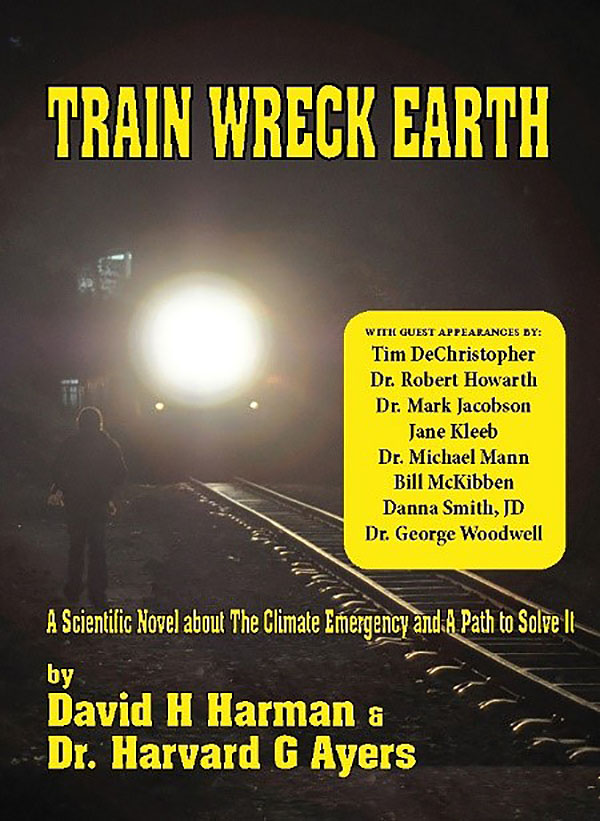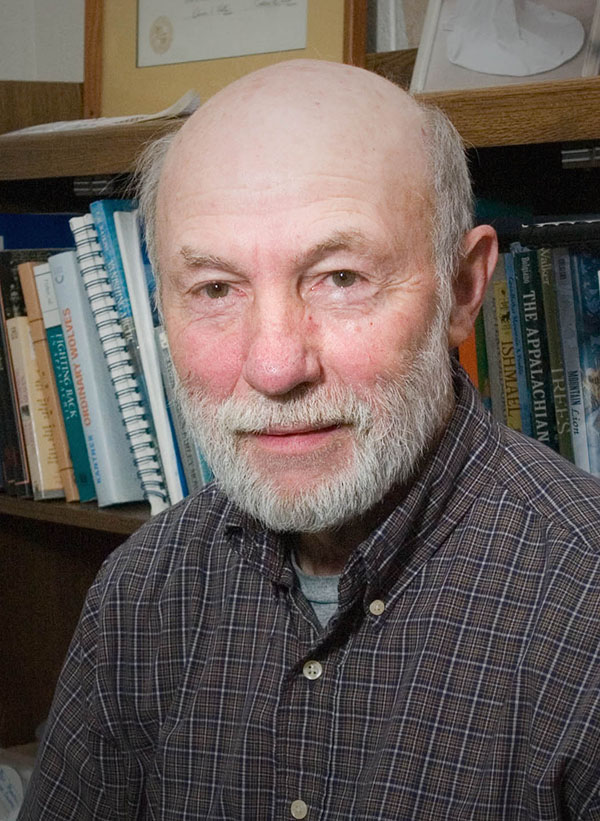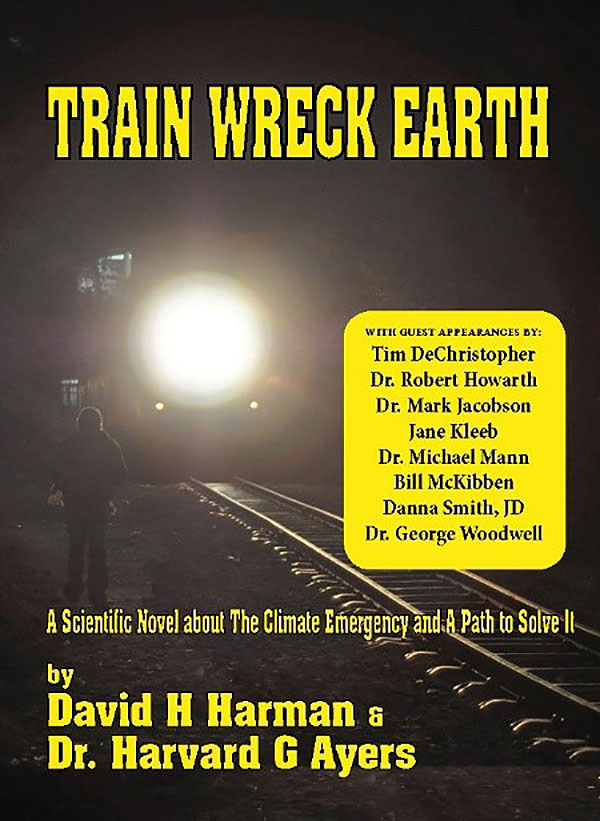Dr. Harvard G. Ayers, professor emeritus of anthropology at Appalachian State University, right, is co-author of “Train Wreck Earth.” Photo by Marie Freeman
BOONE, N.C. — If Mother Earth has a common enemy, who or what is it? Pollution? Nuclear war? An extraterrestrial species? The correct answer, according to “Train Wreck Earth,” the new novel by Dr. Harvard G. Ayers, professor emeritus in Appalachian State University’s Department of Anthropology, and David Harman, a retired North Carolina certified public accountant, is climate change.
The book, which was self-published by Ayers and Harman in October 2017, explains why climate change is affecting the earth and how to solve what the pair terms as “climate chaos.”
The book, set in novel format but filled with scientific information presented in a “classroom” setting, offers the latest research and legislation affecting our climate, as well as viewpoints from prominent climate activists and scientists, including Dr. Michael Mann, distinguished professor of atmospheric science at Penn State and director of Penn State’s Earth System Science Center; Bill McKibben, founder of 350.org, scholar in residence in environmental studies at Middlebury College and author of “The End of Nature”; and Dr. Robert Howarth, professor of ecology and environmental biology in Cornell University’s Department of Ecology and Evolutionary Biology.
In the book’s forward, Jane Kleeb, founder of political advocacy group Bold Nebraska, states, “Anyone who would like to get a full-fledged explanation of the only existential crisis facing the Earth (nuclear war may be an exception) from two very capable science writers and seven climate experts would do well to give ‘Train Wreck Earth’ a go. The novel-ish qualities of the frame story and the development of the fictional characters in the book make it like no other about such a heavy scientific subject that I could honestly call a page turner.”
“Until we wrote ‘Train Wreck Earth,’” Harman, co-owner of Harman-Maulden Designs Inc., said, “no one had presented this complex phenomenon in terms that nonscience readers could understand. We found a way to tell this story clearly, explaining the settled, proven science in the context of a fictional setting with a compelling morality tale, which will motivate the reader to pursue to the last page of the last chapter. The reader will then clearly understand why taking action now is urgent.”
By David H. Harman and Dr. Harvard G. Ayers
2017
About Dr. Harvard G. Ayers
Ayers, professor emeritus in Appalachian’s Department of Anthropology, is a social scientist who writes general interest books and journalistic pieces to explain contemporary environmental and social justice issues of great interest.
His interests and areas of study include archaeology, physical anthropology, forensic anthropology, human ecology of the southern Appalachians, North American Indians and the Southwestern United States.
In addition to “Train Wreck Earth,” he has authored and edited two other books: “An Appalachian Tragedy: Air Pollution and Tree Death in the Eastern Forests of North America” (Sierra Club Books, 1998), which Ayers co-edited with Charles E. Little and Jenny Hager; and “Arctic Gardens: Voices from an Abundant Land” (Artic Voices, 2010), which Ayers co-authored with Harman and Landon Pennington ’05, founder and president of Boone-based Collaborative Solar, a company that designs, develops and integrates residential- and commercial-scale solar photovoltaic systems.
Ayers has been an environmental activist since 1976 and has led and/or founded 12 environmental organizations, including the native American Sites Committee of the Sierra Club, Coal River Mountain Watch and Friends of Blair Mountain of West Virginia, Appalachian Voices, Arctic Voices and Climate Voices U.S. He currently serves as the executive director of The Climate Times and as chair of the North Carolina Climate Solutions Coalition.
Under Ayers leadership, the North Carolina Climate Solutions Coalition wrote and promoted, over a two-year period, the North Carolina Clean Smokestacks Act — which is officially titled the Air Quality/Electric Utilities Act (SB 1078) — that was passed by the North Carolina General Assembly in 2002.
About the Department of Anthropology
The Department of Anthropology offers a comparative and holistic approach to the study of the human experience. The anthropological perspective provides a broad understanding of the origins as well as the meaning of physical and cultural diversity in the world — past, present and future. Learn more at https://anthro.appstate.edu.
About Appalachian State University
As a premier public institution, Appalachian State University prepares students to lead purposeful lives. App State is one of 17 campuses in the University of North Carolina System, with a national reputation for innovative teaching and opening access to a high-quality, cost-effective education. The university enrolls more than 21,000 students, has a low student-to-faculty ratio and offers more than 150 undergraduate and 80 graduate majors at its Boone and Hickory campuses and through App State Online. Learn more at https://www.appstate.edu.
What do you think?
Share your feedback on this story.







![How NCInnovation Is Rethinking Economic Development in North Carolina [faculty featured]](/_images/_posts/2026/02/rethinking-economic-development-600x400.jpg)







